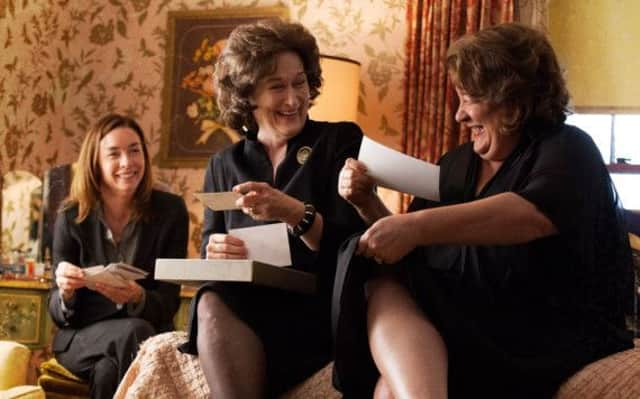FILM REVIEW: August: Osage County


The estranged Weston sisters reunite with their mother Violet (Meryl Streep) at the family home in Oklahoma when their father, Beverley (Sam Shepard), walks out one morning and doesn’t return.
‘Life is long’. Well’s film opens with this famous T.S. Elliot quote. It’s a statement that reinforces the film’s tone of despair. As Beverley admits to being a quiet alcoholic, Violet stumbles into the scene high on pills and overflowing with spite. The bitter decay of a marriage is placed on full display.
Advertisement
Hide AdAdvertisement
Hide AdSuffering with mouth cancer, Violet’s addiction to pills escalates following Beverley’s disappearance and she directs a tirade of vitriolic outpourings towards her family as toxic as the drugs she takes. A significant portion of the film takes place at the dinner table and the venomous spite that spews from Violet’s mouth here repels and shocks.
Everyone is fair game from needy, husband-seeking daughter Karen (Juliette Lewis), to sweet but slow nephew ‘little Charlie’ (Benedict Cumberbatch). ‘Nothing gets passed me,’ Violet asserts, as she draws her family further into her web of hate with deliberate insults and manipulation.
Everyone on the receiving end of Violet’s diatribe battles with their own demons but eldest daughter Barbara’s (Julia Roberts) are given the most attention - a husband cheating with a younger woman, a teenage daughter slipping off the rails, and a realisation that she is growing more like her mother. It’s a realisation that boils over into a physical altercation as mother and daughter come to dramatic blows.
The film’s screenplay is adapted by Tracy Letts from his own Pulitzer Prize winning play. This dialogue fuelled masterpiece stokes the powerhouse fire of Streep and Roberts.
Advertisement
Hide AdAdvertisement
Hide AdGripping performances from these two fine actresses have resulted in Oscar nominations for both. Streep commands the screen as she shifts from snide remarks to full on fury, giving her character an acrid but sharp wit in this unmissable role.
Despite being reduced considerably from the play’s three hour plus run time, Letts’ screenplay sinks it’s teeth into plenty of meaty themes. Through Violet’s embittered world view and Barbara’s crushed dreams, we explore ageing and the passage of time from a uniquely female perspective.
Barbara’s hot headed dealings with husband Bill (Ewan McGregor) suggest similarities with her mother, while Violet’s recollections of her own mother bring generational issues to light. We are left wondering if we can ever escape our
mothers. ‘If we could see the future, we would never get out of bed,’ says Barbara in a moment of absolute wretchedness.
Advertisement
Hide AdAdvertisement
Hide AdThere’s a lot to digest here and Wells’ film would benefit from some quieter moments in which to reflect. Instead the screenplay’s attention lies predominantly with frantic moments of rabid dialogue brimming with heavy, claustrophobic tension.
There are exceptions, Violet has a quiet moment with her daughters out on the lawn and Uncle Charlie (Chris Cooper) has a dignified but forthright discussion with his wife in which he sticks up for his heavily criticised son. It is in precisely these moments where August: Osage County packs its emotional punch. While Wells gives us a scattering of beautifully photographed horizons, this film version of Letts’ acclaimed play requires a more vivid cinematic edge to
distinguish it it from its onstage counterpart.
There remain elements in Letts’ adaptation that feel underplayed - the relationship between Violet and the Native American housekeeper her husband employs is left relatively under-explored - yet the machinations of Violet’s inner circle is enough to sustain August: Osage County through to its thought-provoking conclusion.
Wells’ darkly comic film about family ties delivers tension, fierce dialogue and meaty themes. With immense performances from it’s leads and a shrewd supporting cast,
August: Osage County is a powerful drama. If only Wells’ had lingered in the quiet moments, it might have been superb.
Certificate: 15
Running Time: 121 minutes
Verdict: 4/5